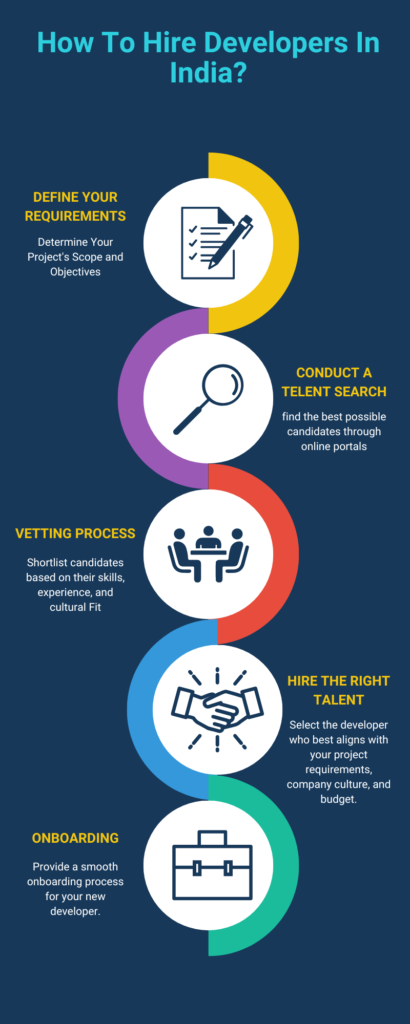
In today’s fast-paced digital world, businesses are increasingly looking beyond borders to find top development talent. India has emerged as a leading destination to hire developers from India due to its growing pool of job-ready engineers and budget-friendly development services. In 2025, employability among Indian engineering graduates was about 72%, rising from approximately 65% in 2024. The overall employability of youth in India stood at around 55% in 2025. This steady growth reflects the increasing availability of capable developers who are experienced in modern tools and technologies like AI, blockchain, and cloud computing.
The demand for software development continues to grow globally. According to the U.S. Bureau of Labor Statistics, employment for software developers, quality assurance analysts, and testers is expected to grow by 17% from 2023 to 2033, which is much faster than the average for other professions. Businesses looking to hire software developer India professionals can stay ahead of the competition by working with this growing pool of skilled developers.
In this guide, we’ll explain how to hire developers from India, discuss the main benefits, and help you find the right team for your project.
Let’s get detailed below,
India’s respected and well-known IT industry is home to experienced professionals who help businesses build high-quality software. This is why companies often hire developers from India to ensure project success.
Businesses looking to hire web developers from India can easily find specialists with the right skills, thanks to the country’s vast pool of over 5 million IT professionals, as revealed by a 2023 Nasscom report.
India is widely known as a top destination for IT outsourcing, providing businesses with reliable technology solutions and 24/7 support. Studies have shown that Indian developers excel in math and logical reasoning compared to developers in the USA, which gives them an edge when handling complex software projects. In fact, by 2025, India is set to surpass the USA in software development workforce size, becoming the largest hub for developers. This is great news for businesses looking to hire a developer from India who can handle anything from website development to advanced programming tasks.
One of the main reasons companies work with skilled developers from India is the significant cost savings. Software development services in India are typically 50-60% more affordable than in Western countries. This makes it easier for businesses to hire Indian developers without stretching their budgets, allowing them to invest more in other critical areas like marketing or product growth.
If you are wondering why so many businesses prefer to hire developers from India, there are plenty of practical reasons that go beyond just saving money. There are some valuable reasons to consider why you should hire developers in India:
Hiring developers in countries like the US or UK can drain a company’s budget quickly. For example, a PHP developer in the US earns around $100,000 per year, while an Indian developer earns approximately ₹400,000 annually (about $4,800). This massive difference in wages is mainly due to India’s lower cost of living and currency value, making it easier for businesses to hire software developers in India without overspending.
Lower Labor Costs – Hiring skilled developers who work remotely can significantly reduce your business’s operational costs. You eliminate expenses related to setting up a physical office, purchasing equipment, and maintaining an in-house HR team. Developers in India, in particular, are experienced in remote work, enabling companies to reduce office-related overheads while still ensuring high-quality software development and timely project delivery.
Large Talent Pool – India produces a vast number of engineering graduates every year, adding fresh talent to the technology sector. This creates a highly competitive job market, giving businesses access to professionals with up-to-date technical knowledge and expertise across various programming languages and development frameworks. Companies benefit from working with developers who bring innovative solutions and stay current with industry trends.
Government Incentives – The Indian government supports the growth of the IT sector by providing tax breaks and financial incentives to technology companies. This has helped create an environment where both startups and large businesses can thrive while building their development teams.
Reduced Overhead – Top global companies like Microsoft, IBM, and Google have built dedicated development teams in India, trusting the country’s skilled developers to deliver high-quality software solutions across cloud, AI, and enterprise systems.
If your business needs to build a website, develop custom software, or scale digital products, hiring Indian developers is a smart, cost-effective choice. They are valued for their technical expertise, timely delivery, and commitment to quality – all while reducing development costs.
One of the biggest benefits of working with Indian developers is the time zone difference. While your team is offline, development work continues in India, ensuring faster project completion and continuous progress.
This time zone advantage allows businesses to accelerate software development, improve efficiency, and maintain a steady workflow without delays. Whether you need a website, a mobile app, or a complex software solution, Indian developers ensure your project stays on track.
| Parameter | Key Benefits |
| Cost-effectiveness | Lower salaries, government incentives, and reduced overhead costs. |
| Top-notch skills | Excellent education, diverse skills, adaptability, and global experience. |
| Minimal communication barrier | English proficiency, active listening, strong technical writing, and cultural awareness. |
| Time zone advantage | 24/7 work cycle, quick responses, overlapping work hours, flexible workflow. |
| Flexible hiring options | Scalable on demand, project-based work, remote work expertise, reduced risk. |
| Abundant talent pool | Fills talent gaps, and ensures cutting-edge skills. |
| Collaboration with reliable firms | Lower risk, quality assurance, expertise, better communication. |
Hiring offshore software developers can transform your business by giving you access to skilled talent at competitive rates. India has long been a leading destination for software development services, trusted globally for technical expertise and cost efficiency. Here’s a clear, step-by-step guide to hiring developers from India successfully.
Start by outlining your project goals and specific requirements.
Having a clear scope will help you filter candidates and set realistic expectations when you hire developers from India.
Use trusted platforms to connect with experienced developers:
These platforms allow you to view developer profiles, client reviews, and portfolios, helping you hire remote software developers from India who align with your technical and business needs.
Once you have a list of potential candidates, narrow it down based on these key factors:
Taking the time to evaluate technical expertise and work style will help you hire Indian developers who can seamlessly integrate into your team.
Before committing to a long-term contract, test the developer’s skills and compatibility with a small trial task:
Trial projects minimize risk, ensuring you hire web developers from India or software experts who meet your standards before investing in a long-term partnership.
Once you finalize the developer, focus on proper onboarding:
A well-executed onboarding process ensures remote developers can contribute quickly and effectively, setting the foundation for a successful working relationship.
Choosing to hire developers from India gives you access to world-class talent, innovative solutions, and budget-friendly software development. By defining your scope, assessing skills, and building strong collaboration, you’ll find the right developers to bring your ideas to life—whether it’s a small website project or a large-scale software solution.

Hiring the right developer is crucial for the success of your project, especially when working with remote teams. A thorough screening and evaluation process helps ensure you bring on board skilled professionals who align with your technical requirements and company culture. Here’s a comprehensive approach to vetting developers effectively.
Utilize online platforms like HackerRank or Codility to evaluate a candidate’s coding skills and problem-solving approach. These platforms offer a standardized way to assess a developer’s proficiency in specific programming languages and frameworks. However, tailor the assessments to the role you are hiring for:
Consider assigning small project-based tests that simulate real-world tasks, rather than relying solely on generic coding questions. This will help gauge the candidate’s practical capabilities and problem-solving approach.
Example: If hiring a React developer, ask them to build a simple user interface component or integrate an API to evaluate their hands-on experience.
Technical Interviews: Schedule interviews with senior developers to assess the candidate’s technical knowledge and problem-solving abilities. Live coding or pair programming tasks can offer valuable insights into their approach.
Cultural Fit Interviews: Evaluate communication skills, work style, and time zone flexibility. Ensure they can explain technical concepts clearly and adapt to your team’s workflow.
Example Questions:
Pro Tip: Share an interview agenda in advance and ensure a stable internet connection for smooth communication—especially important when you hire a software developer in India.
Once the technical assessment and interviews are complete, compile all feedback to create a complete candidate profile:
Additionally, conduct reference checks to verify the candidate’s work history and professional reliability.
Helpful Tools for Managing Remote Teams:
A well-rounded vetting process significantly improves your chances of hiring a developer who meets your project needs and contributes positively to your team dynamics.
Even after assessments and interviews, consider offering a short trial period (e.g., two to four weeks) to evaluate the developer’s performance in a real project setting. This allows you to see how they integrate into your team, meet deadlines, and solve practical challenges.
During this period, observe:
This is particularly useful when hiring remote developers, as it provides a low-risk way to confirm their capabilities before committing to a long-term engagement.
Hiring is just the first step. Regular performance evaluations help ensure your developer continues to meet project standards. Schedule periodic reviews to discuss:
This fosters a culture of continuous improvement and strengthens your remote development team over time.
Building a cohesive team is vital for successful collaboration. Here are some best practices for onboarding remote developers from India:
There are several scenarios where hiring developers from India can be a strategic advantage:
Hiring developers from India is a smart and practical choice for businesses that need skilled professionals, flexible work arrangements, and budget-friendly development solutions. India’s vast talent pool, technical expertise, and strong English communication skills make it easier for companies to find the right developers for any project—whether it’s building a website, developing custom software, or scaling up existing systems.
To get the best results, follow a structured hiring process, carefully evaluate candidates, and focus on building a solid working relationship. When remote developers feel valued and aligned with your goals, they are more likely to deliver high-quality work on time.
Choosing the right development partner in India can give your business a competitive edge—combining reliable talent with cost efficiency to bring your projects to life faster and more effectively.
